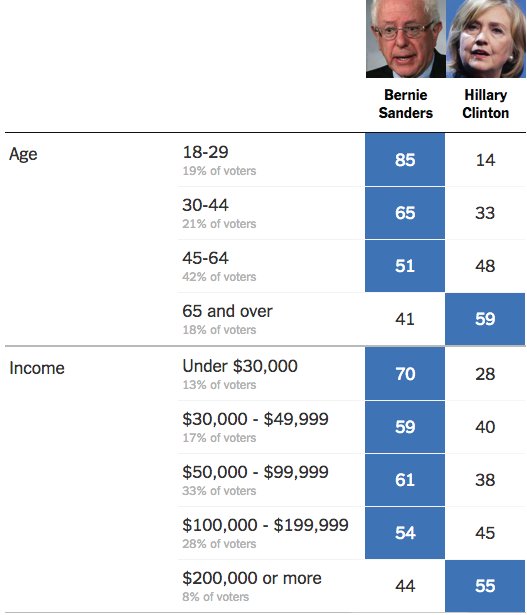So if you're like an everyday kind of bloke that doesn't have an economics Ph.D or the luxury of memorizing the Scriptures of whatever you've been told is the arbiter of Right Thinking, this can make you feel pretty powerless. Sure, anyone can figure out that a platform of giving every citizen $1 million and a unicorn isn't a realistic plan; but what about, say, a basic platform of redistribution centered on a higher minimum wage, universal healthcare, free college tuition, and so on?
This is, you may recognize, the backdrop over which the Democratic primary is currently being contested, with liberal policy wonks attempting to paint Bernie voters who support the latter as haplessly, naively advocating the former.(This has led to the amusing sideshow of supposed liberal leading lights sneering at "entitlements," mocking Bernie's "free stuff" like proper class-conscious conservatives). But, as the blog Interfluidity writes:
Paul Ryan’s various budgets haven’t been wrong because they require giant magic asterices to make the numbers add up. They have been wrong because the interests and values Paul Ryan represents are wrong. The magic asterices don’t reflect dumb mistakes, but smart politics. The problems of our polity do not arise because one faction or another is too stupid to do high quality science. If your interests are the interests of the fossil fuel industry, and you are unwilling or unable to transcend the narrowness of those interests, then confusing the public about the science of climate change is a mark of intelligence, not stupidity. Being smart is great. You may be proud of your GRE scores, your PhD, your Nobel Prize even. And deservedly! But raw intellect is not scarce, and no faction holds anywhere near a monopoly.Liberal technocrats would deny that they have any ulterior motives at all; they are merely driven to report empirical fact, namely that it's impossible for us to meet everyone's basic needs through redistribution. (Call it the liberal argument for full socialism; perhaps we should take them up on the offer!) Alas, we probably don't need to believe them. As good middle-class climbers, liberals support meritocracy over egalitarianism, a tepid amelioration of the worst excesses of capitalism to assuage their consciences while still rewarding the proper winners and losers. Or, in the words of the late great Utah Phillips, "the difference between a liberal and a conservative is a liberal will hang you from a lower branch."
As Mike Konczal writes, there will always be a necessity to have policy experts:
I think the wonk analysis is an essential part of the ideological work currently being done and is capable of advancing the progressive project in crucial ways. Working the numbers and the specifics creates clarity, and it forces people to put their cards on the table.
In this specific moment, the work of the wonk forces one to justify constraints, lets you know if you are looking in the correct places, gives you a sense of whether the scope and scale of your changes is sufficient, and lets you know the obstacles and enemies you’ll face.Politics are mostly about values. Voters who think work should pay a living wage, or health and well-being shouldn't be decided on the ability to pay, needn't fear intimidation by prophets preaching ideology masked as science. That is, if we believe in "government by the people" after all.



